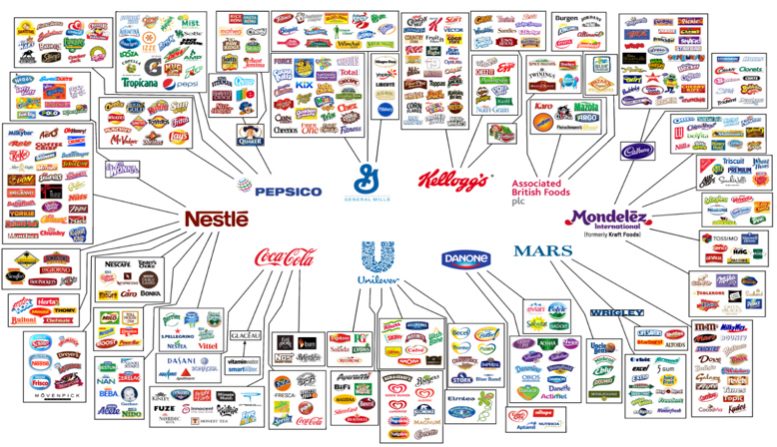Big Food: Bad Guys?
Last Updated on February 23, 2023
It’s time to stop blaming ‘Big Food’. Continuing to blame the food companies for what we feed ourselves and consequent poor health is easy, but has the moment passed?
Blaming ‘Big Food’ is not going to change our individual health situations, they produce what we buy. We, as consumers control what we buy, how we cook and ultimately what goes into our mouths and the mouths of our children. We have the power to dictate to the food companies what we will buy, and what we won’t.
The Buck Stops Here
Without getting into the weeds of what is in our food and why the food companies have been shamed into making necessary changes, the fact is they have listened and are making those changes, but it takes time.
That said, Food Scientists provide compelling evidence and arguments that debunk concerns. There’s two sides to every story and as the saying goes, the truth often lies somewhere in the middle.
With so much information available nowadays and everyone sharing content with their friends the art of separating fact from fiction should be honed. It would cut down a lot of the increasing and unnecessary anxiety in our everyday lives.
Bringing the Who’s Who of the Food Industry
The JBF conference this year focused on the Food Movement that brought together people from every corner of the Food Industry. Farmers to politicians, chefs to representatives from big food companies and everyone in between involved with food in some way. The James Beard Foundation is known as the Oscars of the Food Industry, so they had some very high profile speakers and attendees.
“It might sound odd to say this about something people deal with at least three times a day, but food in America has been more or less invisible, politically speaking, until very recently” –Michael Pollan
The Administrations’ cheap food policy has had disastrous long term effects on public health and the environment, thus creating the need for serious change, a ‘Food Movement’.
‘Aha’ Moment
Together the industry has a much bigger, stronger voice to be effective change agents. These changes will benefit each and every one of us, with regards to our health, and the health of our children. Listening to the experts, so passionately discussing the issues facing the food system from their unique perspectives left me overwhelmed but inspired; something needs to be done now.
We may think that we are not influential enough individually to make a difference, but I think that’s wrong. A spokesperson from FoodTank said “Every time you buy food, you are basically voting for the kind of food system you want” and boy did that resonate with me.
“Big Food” is not the enemy. We are often lead to believe that these organizations are full of bad people plotting to destroy humanity one processed TV dinner at a time! In my experience, this perception couldn’t be further from the truth. The Food Industry is made up of the most authentic and collaborative people on the planet.
Food attracts people that want to feed others; it’s an inherently nurturing trait which I think goes unnoticed, it’s upsetting to see so many genuinely good people villainized.
My ‘aha’ moment during the speeches was that–like any business–they produce what we are buying. They are a ‘business’ first and foremost. Why would they make food that nobody buys? We, as consumers have the biggest voice.
Richard McCarthy from Slow Food USA put it best for me, he said;
We designed a world where it’s easy to eat badly
Now we are getting sick and the word is spreading, blame is being placed on ‘Big Food’ and while they certainly are not totally innocent bystanders we, as consumers, need to take some responsibility in the part we have played.
We need to stop blaming and focus on pushing forward for the sake of our own health and the health of our children, it’s personal whether we’re ready to accept it or not.
Richard went on to say “The fact that large companies are responding should be applauded”, and I couldn’t agree more. ‘Big Food’ isn’t going anywhere and it would be a disaster if it did, so let’s embrace, encourage and support change.
Change agents and The Future of Food
By 2050, 9.6 Billion people will inhabit this planet, and that’s a lot of pressure on the food industry. Another challenge is attracting young people to pursue careers in the sector. How can we attract people to the industry if we condemn a huge player?
Students and grads who have pursued a food program (Food Science, Culinary, Processing, Ag) or are interested in joining the industry will work for (or with) Nestle, Campbells, Kelloggs, General Mills, Mars or Pepsico, it a definite possibility in their future.
We need them to be proud of this and tell their friends! How does vilifying these organizations encourage the pursuit of food and beverage careers? We need forward thinking, talented people to pursue the skills necessary to work in this sector, driving the change our food system needs.
We can ALL make a difference
Every time we enter a grocery store (whether it’s Walmart, Loblaws, Target, Tesco, Food Basics, we all have different preferences and bank accounts) we are telling ‘Big Food’ what we like.
We are telling them what we want them to continue to produce and stock on their shelves.
There’s a long way to go and no doubt that the onus is on them to provide healthy food choices, according to the experts, ‘Big Food’ is dictated to by their customers. So, based on your food preferences, what are you telling them?
Subscribe to our newsletter for details on mentorship sessions, workshops, webinars, as well as career and job fairs across Canada and the US!


leave your comment